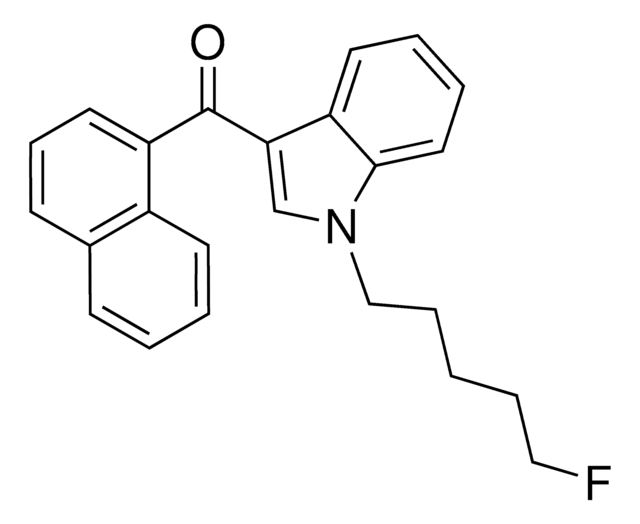SML0327
AM630
≥90% (HPLC)
Synonym(s):
6-Iodo-2-methyl-1-[2-(4-morpholinyl)ethyl]-1H-indol-3-yl](4-methoxyphenyl)methanone, AM 630, Iodopravadoline
About This Item
Recommended Products
Assay
≥90% (HPLC)
form
powder
storage condition
desiccated
color
white to beige
solubility
DMSO: >5 mg/mL
storage temp.
2-8°C
SMILES string
COc1ccc(cc1)C(=O)c2c(C)n(CCN3CCOCC3)c4cc(I)ccc24
InChI
1S/C23H25IN2O3/c1-16-22(23(27)17-3-6-19(28-2)7-4-17)20-8-5-18(24)15-21(20)26(16)10-9-25-11-13-29-14-12-25/h3-8,15H,9-14H2,1-2H3
InChI key
JHOTYHDSLIUKCJ-UHFFFAOYSA-N
Application
- as a cannabinoid 2(CB2) inhibitor to study the analgesic effect exerted by polysaccharopeptide from Trametes versicolor (TPSP).
- as a CB2 antagonist along with β-caryophyllene (BCP) to study its effects on re-epithilialization of fibroblast cells.
- as a CB2 antagonist to study its interaction with 17-β-estradiol in primary human osteoblasts.
Biochem/physiol Actions
Features and Benefits
Signal Word
Warning
Hazard Statements
Precautionary Statements
Hazard Classifications
Aquatic Acute 1 - Aquatic Chronic 1
Storage Class Code
11 - Combustible Solids
WGK
WGK 3
Flash Point(F)
Not applicable
Flash Point(C)
Not applicable
Certificates of Analysis (COA)
Search for Certificates of Analysis (COA) by entering the products Lot/Batch Number. Lot and Batch Numbers can be found on a product’s label following the words ‘Lot’ or ‘Batch’.
Already Own This Product?
Find documentation for the products that you have recently purchased in the Document Library.
Customers Also Viewed
Our team of scientists has experience in all areas of research including Life Science, Material Science, Chemical Synthesis, Chromatography, Analytical and many others.
Contact Technical Service














